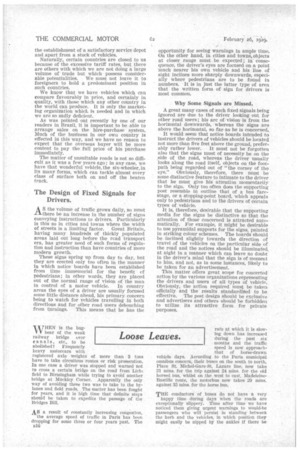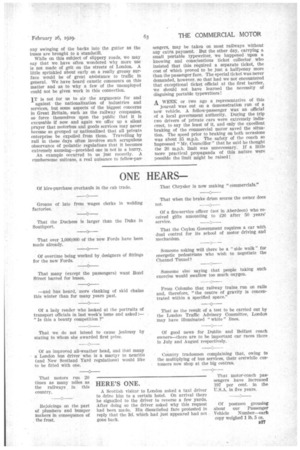WHEN is the buo - V V bear of the wea k railway bridge over
Page 42

Page 43

If you've noticed an error in this article please click here to report it so we can fix it.
canals, etc., to be abolished? Frequently heavy motorcars with
registered axle weights of more than 3 tons have to take circuitous routes or risk prosecution. In one case a driver was stopped and warned not to cross a certain bridge on the road from Lich-, field to Birmingham while trying to avoid another bridge at Muckley Corner. Apparently the only way of avoiding these two was to take to the bylanes and field roads. The matter has been fought for years, and it is high time that definite steps should be taken to expedite the passage of the Bridges Bill.
AS a result of constantly increasing congestion, the average speed of traffic in Paris has boon dropping for some three or four years past. The B16 rate at which it is slowing down has increased during the past six months And the traffic speed is now approachthat of horse-drawn vehicle days. According to the Paris municipal omnibus concern, their buses on the south to north, Place St. Michel-Gare-St. Lazare line, now take 21 mins. for the trip against 24 mins. for the old horsed bus, whilst on ,the west to east, MadeleineBastille route, the motorbus now takes 29 mins. against 35 mins. for the horse bus.
THE conductors of buses do not have a very happy time during days when the roads are exceptionally slippery. Time after time we have noticed them giving urgent warnings to would-be passengers who will persist in standing between the kerb and the vehicles, in which position they might easily be nipped by the ankles if there be
any swinging of the backs into the gutter as the buses are brought to a standstill.
While on this subject of slippery roads, we may say that we. have often wondered why more use is not made of grit on the streets of London. A little sprinkled about early on a really greasy surface would be of great assistance to traffic in general. We have heard caustic comments on this matter and as to why a few of the unemployed could not be given work in this connection.
IT is not for us to air the arguments for and against the nationalization of industries and services, but some aspects of the biggest concerns in Great Britain,such as the railway companies, so force themselves upon the public that it is excusable if now and again we offer up a silent prayer that motorbus and goods services may never become so grouped or nationalized that all private enterprise be expelled from them. Travelling by rail in these days often involves such scrupulous observance of pedantic regulations that it becomes extremely amusing—provided one is not in a hurry.
An example occurred to us just recently. A cumbersome suitcase, a real nuisance to fellow-pas
sengers, may be taken on most railways without any extra payment. But the other day, carrying a small portable typewriter, we happened upon a knowing and conscientious ticket collector who insisted that this required a separate ticket, the cost of which proved to be just a halfpenny more than the passenger fare. The special ticket was never demanded, however. so that had we not encountered that exceptional ticket official at the first barrier, we should not have learned the necessity of disguising portable typewriters!
A W.REIS. or two ago a representative of this
journal was out on a demonstration run of a new vehicle. A fellow-passenger as an official of a local government authority. During the trip two drivers of private cars were extremely indiscreet, to say the least of it, and only the excellent braking of the commercial motor saved the situation. The speed prior to braking on both occasions was about 35 m.p.h. The safety of the coach so Impressed "Mr. Councillor" that he said he thought the 20 m.p.h. limit was unnecessary. If a little more practical propaganda of this nature were possible the limit might be raised!




















































































































